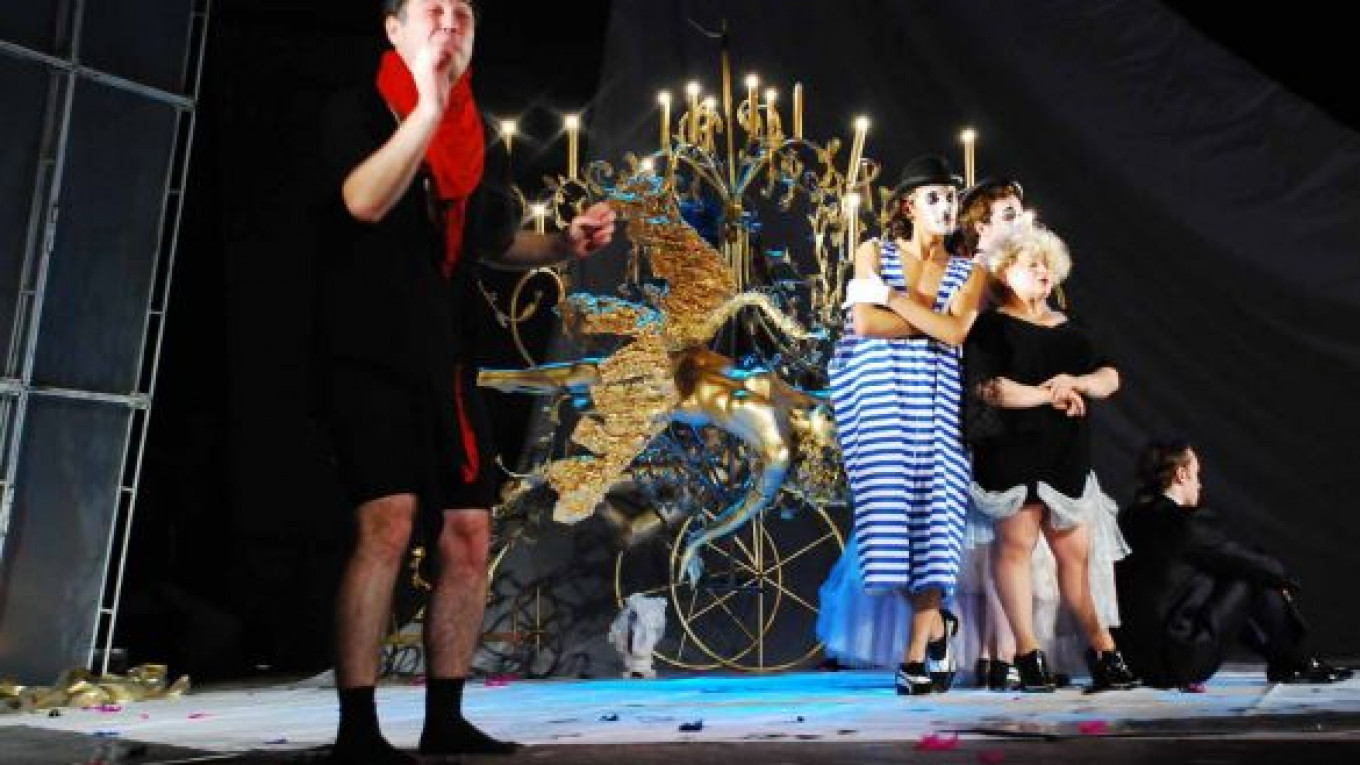Audiences and critics were generous with praise when the best of Polish theater came to Moscow for a week in March, during the Golden Mask Festival.
Those theaters of Warsaw may not be around anymore but Polish culture is still available, now and again, at the Polish Theater in Moscow, which stages the best of Polish theater as well as acting as an impromptu cultural center.
A local project set up in 2003 by Ukrainian director Yevgeny Lavrenchuk, the Polish theater’s troupe is mainly made up of Russians with Polish roots and those with a passion for Polish culture and art.
“Polish culture and art are very popular in Russia. No other nation knows Polish culture as well as the Russians, and vice versa,” Lavrenchuk said.
The theater plays masterpieces of 20th-century Polish literature such as the absurdist dramas “Tango” by Slawomir Mrozek, “Ivona, Princess of Burgundy” by Witold Gombrowicz and the symbolist “Snow” by Stanislaw Przybyszewski, with most performances in Polish with Russian subtitles.
Lavrenchuk sees the theater not just as a response to Polish culture but as an artistic statement.
“We can, of course, talk about our Polish descent, but it wouldn’t be completely true,” Lavrenchuk said. “It happened because it was meant to happen. Artists create not because of something but against something.”
Actor Igor Nevedrov learned Polish specially so he could play King Ignatius in “Ivona, Princess of Burgundy” and explained some of the advantages of working in another language.
“Each Slav should be able to speak at least two Slavic languages, because that’s the key to the better understanding of yourself and your culture,” Nevedrov said. “When I started speaking Polish, Pushkin opened up to me from a different perspective.”
Nevedrov and other members of the troupe say they are fascinated with Polish literature because it helps them see Russian art, history and culture through the lenses of a country that has always been between the East and the West.
“Polish culture is a compromise between Slavic metaphysics, paganism and the elements, and European rationality, sophistication,” Lavrenchuk said.
The theater currently sits in the dilapidated Theater Romana Viktyuka in Sokolniki, but the building is in such a dire condition that when they perform they have to do it in other theaters.
Finding a performance though is not as easy as perhaps it should be with the low budget theater treasuring a self-claimed outsider status.
“We are completely independent, and we do what we want,” Lavrenchuk said. “We usually stage our plays in cycles, and probably we will decide to run one this year. But usually we make decisions spontaneously and then think about the options.”
The theater later confirmed that its first performance in 2011 will take place in late October. It will, however, run an acting and directing workshop on July 3.
Nevertheless, Lavrenchuk, who set up the Polish Theater after his successful student performance of Przybyszewski’s “Snow,” has led the theater to much success, winning prizes at festivals in Poland, Germany, Lithuania and Ukraine.
The theater maintains itself with a little help from Polish organizations such as the Polish Senate or the Foundation Aid to Poles in the East, but Lavrenchuk knows that one day they will have to stop being such outsiders.
“I know that joining the mainstream is to some extent a good thing,” Lavrenchuk said. “However, deep in my heart, I feel that there is a risk that we’ll become another cultural institution, which we aren’t now.”
Polish Theater. Tel. +7 (926) 271-5780, .
A Message from The Moscow Times:
Dear readers,
We are facing unprecedented challenges. Russia's Prosecutor General's Office has designated The Moscow Times as an "undesirable" organization, criminalizing our work and putting our staff at risk of prosecution. This follows our earlier unjust labeling as a "foreign agent."
These actions are direct attempts to silence independent journalism in Russia. The authorities claim our work "discredits the decisions of the Russian leadership." We see things differently: we strive to provide accurate, unbiased reporting on Russia.
We, the journalists of The Moscow Times, refuse to be silenced. But to continue our work, we need your help.
Your support, no matter how small, makes a world of difference. If you can, please support us monthly starting from just $2. It's quick to set up, and every contribution makes a significant impact.
By supporting The Moscow Times, you're defending open, independent journalism in the face of repression. Thank you for standing with us.
Remind me later.






